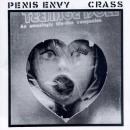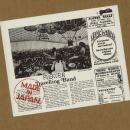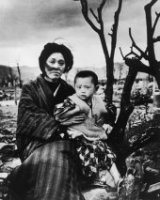They're always there high in the skies...
Nagasaki nightmare, Nagasaki nightmare
Pretty as a picture in the generals' eyes
Nagasaki nightmare, Nagasaki nightmare
They've done it once, they'll do it again
They'll shower us all in their deadly rain
Nagasaki nightmare, Nagasaki nightmare
Nagasaki nightmare, Nagasaki nightmare
Nagasaki nightmare, Nagasaki nightmare
Fishing children fish in the Imperial Waters
Nagasaki nightmare, Nagasaki nightmare
Sons and lovers, lovers and daughters
Nagasaki nightmare, Nagasaki nightmare
Cherry Blossom hanging on the cherry blossom tree
Flash, blinding flash, then there's nothing to see
Nagasaki nightmare, Nagasaki nightmare
Nagasaki nightmare, Nagasaki nightmare
Nagasaki nightmare, Nagasaki nightmare
Dying they're still dying, one by one
Nagasaki nightmare, Nagasaki nightmare
Darkness in the land of the rising sun
Nagasaki nightmare, Nagasaki nightmare
Lesson learnt the lesson? No, cos no one really cares
It's so easy to be silent just to cover up your fears
Nagasaki nightmare, Nagasaki nightmare
Nagasaki nightmare, Nagasaki nightmare
Nagasaki nightmare, Nagasaki nightmare
So they die in the nightmare, nightmare, nightmare, Nagasaki nightmare
And live with the nightmare, nightmare, nightmare, Nagasaki nightmare
Will you stand by and let it happen again?
Nightmare death in the deadly rain
Nagasaki nightmare, Nagasaki nightmare
Live with the nightmare, nightmare, nightmare, Nagasaki nightmare
And die in the nightmare, nightmare, nightmare, Nagasaki nightmare
Nightmare comes in deadly rain
Nightmare, nightmare, nightmare, rain
Nagasaki nightmare, Nagasaki nightmare
Manmade power, manmade pain, Nagasaki nightmare
Deadly rain, deadly rain, Nagasaki nightmare
They'll do it again, shower us in rain
Deadly, deadly, deadly rain
Nagasaki nightmare, Nagasaki Nightmare
Nagasaki nightmare, Nagasaki nightmare
Pretty as a picture in the generals' eyes
Nagasaki nightmare, Nagasaki nightmare
They've done it once, they'll do it again
They'll shower us all in their deadly rain
Nagasaki nightmare, Nagasaki nightmare
Nagasaki nightmare, Nagasaki nightmare
Nagasaki nightmare, Nagasaki nightmare
Fishing children fish in the Imperial Waters
Nagasaki nightmare, Nagasaki nightmare
Sons and lovers, lovers and daughters
Nagasaki nightmare, Nagasaki nightmare
Cherry Blossom hanging on the cherry blossom tree
Flash, blinding flash, then there's nothing to see
Nagasaki nightmare, Nagasaki nightmare
Nagasaki nightmare, Nagasaki nightmare
Nagasaki nightmare, Nagasaki nightmare
Dying they're still dying, one by one
Nagasaki nightmare, Nagasaki nightmare
Darkness in the land of the rising sun
Nagasaki nightmare, Nagasaki nightmare
Lesson learnt the lesson? No, cos no one really cares
It's so easy to be silent just to cover up your fears
Nagasaki nightmare, Nagasaki nightmare
Nagasaki nightmare, Nagasaki nightmare
Nagasaki nightmare, Nagasaki nightmare
So they die in the nightmare, nightmare, nightmare, Nagasaki nightmare
And live with the nightmare, nightmare, nightmare, Nagasaki nightmare
Will you stand by and let it happen again?
Nightmare death in the deadly rain
Nagasaki nightmare, Nagasaki nightmare
Live with the nightmare, nightmare, nightmare, Nagasaki nightmare
And die in the nightmare, nightmare, nightmare, Nagasaki nightmare
Nightmare comes in deadly rain
Nightmare, nightmare, nightmare, rain
Nagasaki nightmare, Nagasaki nightmare
Manmade power, manmade pain, Nagasaki nightmare
Deadly rain, deadly rain, Nagasaki nightmare
They'll do it again, shower us in rain
Deadly, deadly, deadly rain
Nagasaki nightmare, Nagasaki Nightmare
Contributed by Riccardo Venturi - 2005/8/1 - 17:24
"Investigation of all the facts, and supported by the testimony of the surviving Japanese leaders involved, it is the Survey's opinion that certainly prior to 31 December 1945, and in all probability prior to 1 November 1945, Japan would have surrendered even if the atomic bombs had not been dropped, even if Russia had not entered the war, and even if no invasion had been planned or contemplated."
[United States Strategic Bombing Survey; Summary Report. United States Government Printing Office. 1946. pg. 26.]
"In 1945 Secretary of War Stimson, visiting my headquarters in Germany, informed me that our government was preparing to drop an atomic bomb on Japan. I was one of those who felt that there were a number of cogent reasons to question the wisdom of such an act. During his recitation of the relevant facts, I had been conscious of a feeling of depression and so I voiced to him my grave misgivings, first on the basis of my belief that Japan was already defeated and that dropping the bomb was completely unnecessary, and secondly because I thought that our country should avoid shocking world opinion by the use of a weapon whose employment was, I thought, no longer mandatory as a measure to save American lives."
[Eisenhower, Dwight D. (1963). The White House Years; Mandate For Change: 1953-1956. Doubleday & Company. pp. pp. 312–313.]
"The use of [the atomic bombs] at Hiroshima and Nagasaki was of no material assistance in our war against Japan. The Japanese were already defeated and ready to surrender because of the effective sea blockade and the successful bombing with conventional weapons... The lethal possibilities of atomic warfare in the future are frightening. My own feeling was that in being the first to use it, we had adopted an ethical standard common to the barbarians of the Dark Ages. I was not taught to make war in that fashion , and wars cannot be won by destroying women and children."
[Fleet Admiral William D. Leahy, Chief of Staff to President Truman
Leahy, William D. (1950). I was there. New York. pp. 441]
"The US decision to drop atomic bombs on Hiroshima and Nagasaki in 1945 was meant to kick-start the Cold War rather than end the Second World War, according to two nuclear historians who say they have new evidence backing the controversial theory…New studies of the US, Japanese and Soviet diplomatic archives suggest that Truman's main motive was to limit Soviet expansion in Asia, Kuznick claims. Japan surrendered because the Soviet Union began an invasion a few days after the Hiroshima bombing, not because of the atomic bombs themselves, he says.
According to an account by Walter Brown, assistant to then-US secretary of state James Byrnes, Truman agreed at a meeting three days before the bomb was dropped on Hiroshima that Japan was "looking for peace". Truman was told by his army generals, Douglas Macarthur and Dwight Eisenhower, and his naval chief of staff, William Leahy, that there was no military need to use the bomb.
"Impressing Russia was more important than ending the war in Japan," says Selden. Truman was also worried that he would be accused of wasting money on the Manhattan Project to build the first nuclear bombs, if the bomb was not used, he adds."
Rob Edwards, New Scientist, July 2005
From Burning Aquarium Blogspot
[United States Strategic Bombing Survey; Summary Report. United States Government Printing Office. 1946. pg. 26.]
"In 1945 Secretary of War Stimson, visiting my headquarters in Germany, informed me that our government was preparing to drop an atomic bomb on Japan. I was one of those who felt that there were a number of cogent reasons to question the wisdom of such an act. During his recitation of the relevant facts, I had been conscious of a feeling of depression and so I voiced to him my grave misgivings, first on the basis of my belief that Japan was already defeated and that dropping the bomb was completely unnecessary, and secondly because I thought that our country should avoid shocking world opinion by the use of a weapon whose employment was, I thought, no longer mandatory as a measure to save American lives."
[Eisenhower, Dwight D. (1963). The White House Years; Mandate For Change: 1953-1956. Doubleday & Company. pp. pp. 312–313.]
"The use of [the atomic bombs] at Hiroshima and Nagasaki was of no material assistance in our war against Japan. The Japanese were already defeated and ready to surrender because of the effective sea blockade and the successful bombing with conventional weapons... The lethal possibilities of atomic warfare in the future are frightening. My own feeling was that in being the first to use it, we had adopted an ethical standard common to the barbarians of the Dark Ages. I was not taught to make war in that fashion , and wars cannot be won by destroying women and children."
[Fleet Admiral William D. Leahy, Chief of Staff to President Truman
Leahy, William D. (1950). I was there. New York. pp. 441]
"The US decision to drop atomic bombs on Hiroshima and Nagasaki in 1945 was meant to kick-start the Cold War rather than end the Second World War, according to two nuclear historians who say they have new evidence backing the controversial theory…New studies of the US, Japanese and Soviet diplomatic archives suggest that Truman's main motive was to limit Soviet expansion in Asia, Kuznick claims. Japan surrendered because the Soviet Union began an invasion a few days after the Hiroshima bombing, not because of the atomic bombs themselves, he says.
According to an account by Walter Brown, assistant to then-US secretary of state James Byrnes, Truman agreed at a meeting three days before the bomb was dropped on Hiroshima that Japan was "looking for peace". Truman was told by his army generals, Douglas Macarthur and Dwight Eisenhower, and his naval chief of staff, William Leahy, that there was no military need to use the bomb.
"Impressing Russia was more important than ending the war in Japan," says Selden. Truman was also worried that he would be accused of wasting money on the Manhattan Project to build the first nuclear bombs, if the bomb was not used, he adds."
Rob Edwards, New Scientist, July 2005
From Burning Aquarium Blogspot
Alessandro - 2009/4/1 - 09:08
×
![]()
Note for non-Italian users: Sorry, though the interface of this website is translated into English, most commentaries and biographies are in Italian and/or in other languages like French, German, Spanish, Russian etc.









Da/From questa pagina / this page
"On the 6th of August 1945, Hiroshima in Japan, gained a certain permanent place in history as the first city to be destroy by a nuclear bomb. As a result of that attack, 250 000 people alone have died. Three days later, on August the 9, Nagasaki suffered the same faith, a counting for another 60 000 deaths. We will never know how many people are now dying as a result of those attacks. It is estimated that fifty percent of the deaths in the two bombing resulted from burns. Anyone within half a mile from the blast stood little chance of survival, and those that did almost certainly would have died weeks later from radiation sickness. Long term radiation effects are equally terrifying: leukemia, genetic defects, retarded development, malignment deceases, shorten life span, death. Radioactive fallout is carried hundred of miles by the wind and is deposit into the soil by rain and snowfall. The number of deaths and tragedies as a result of nuclear bomb on the earth surface..."